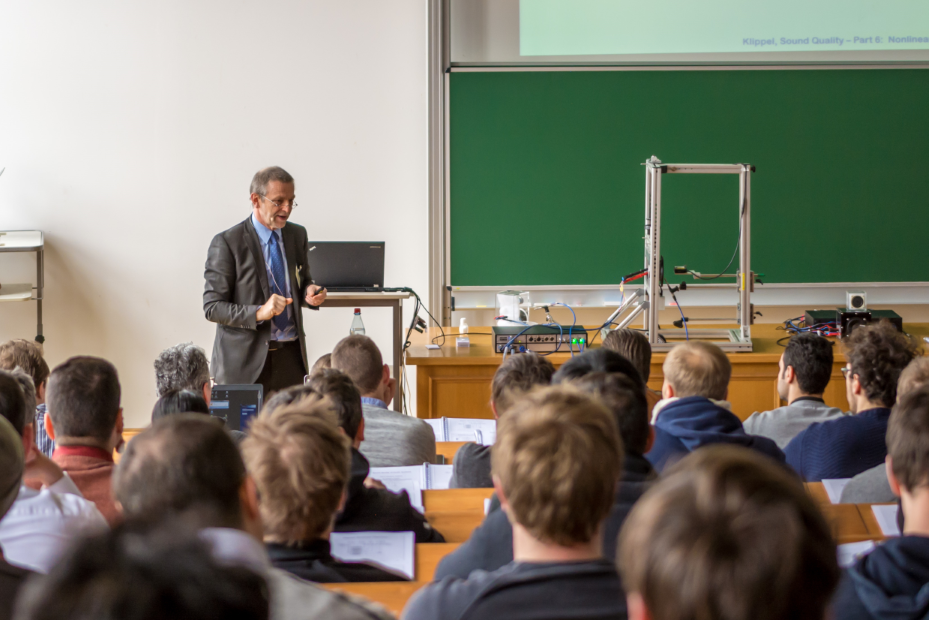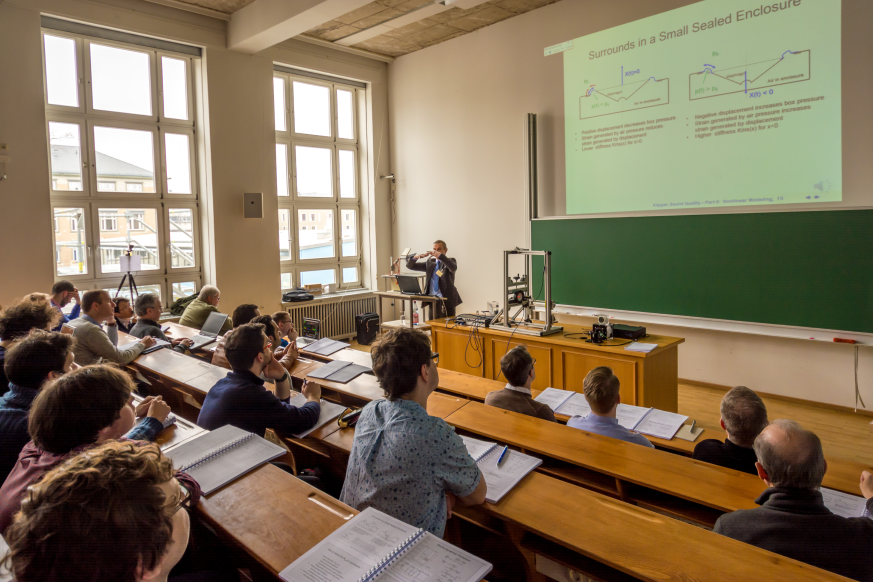3-Day Lecture "Sound Quality of Audio Systems"

The annual lecture on “Sound Quality of Audio Systems” presented by Dr. Wolfgang Klippel, professor at the Institute of Acoustics and Speech Communication (Technical University of Dresden), will give you a deep understanding of measurement and diagnostic techniques used in telecommunication, automotive, multi-media, and professional applications to design small, light and cost-effective loudspeakers.
Linear, nonlinear and time-variant systems with lumped and distributed parameters model the generation of signal distortion. The course makes the relationship between symptoms and physical causes of the distortion more transparent. Practical sections will give each participant further opportunities for learning by doing.
Presented by:


3-Day Lecture
When: March 4-6, 2024 (9 am - 5 pm)
Where: Dresden University of Technology
Language: English
Registration Fee: 500€ (VAT incl.)
Free of charge for students and university staff.
Further Information
- Catering (snacks, lunch and drinks) will be provided.
- Please click here for our Hotel Recommendations within easy reach of the Dresden University of Technology.
- Download the Information Flyer.

Highly Recommended for
- Students and teachers of the electro-acoustics
- Engineers of the audio industry active in research & development,
manufacturing, quality control
Content of the 3-Day-Lecture
Electro-Acoustical Modeling
- Fundamentals - Transduction, vibration, radiation
- Abstraction - Models with lumped and distributed parameters
- Small Signal Performance - Linear approximation and transfer function
- Large Signal Performance - Thermal dynamics and nonlinearities
- Time-varying properties - Influence of climate and aging
Digital Loudspeaker Control
- Targets - Equalization, linearization, speaker protection, and self-testing
- Mirror filter - Nonlinear structure derived from physical modeling
- Adaptive control - Parameter feedback by using the speaker as a sensor
- Green speaker design - Maximizing efficiency by exploiting nonlinearities and resonances
- Intelligent transducer module - Combining DSP, amplifier, and transducer
Interpretation and Diagnostics
- Interpretation - Measured symptoms and physical causes
- Perception - Audibility, and impact on perceived sound quality
- Evaluation - Selection of optimal drive units for system design
- Specification - Minimal but comprehensive set of data
- Tolerances - Parameter variation and climate influences
Measurement and Analysis
- Persistent excitation - Artificial and natural stimuli
- Monitored signals - Electrical, mechanical, and acoustical sensors
- Complex structures - Digital and analog components
- Sound field - Measurements in the near and far field
- Interaction with the room - Direct and diffuse sound part
- Measurement time - Ultra-fast and long-term (power) testing
- Distortion analysis - Linear and nonlinear components
- System identification - Optimal fitting and parameter estimation
- Transformations - Fourier, wavelet, and perceptual modeling
- Data compression - Separation of unique and redundant information
New Topics of the 3-Day Lecture 2024
- IEC standard 60268-23 for testing large loudspeakers
(panels, arrays, TV monitors, ...) - Rating max SPL according to IEC standard 60268-21
- Testing transducers with small baffles on the KLIPPEL Multi-Scanning Workbench
- Measuring the nonlinear residuum in reproduced music signals


